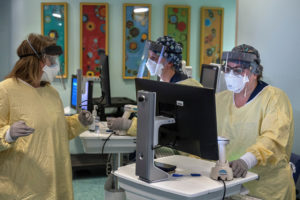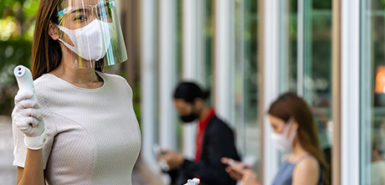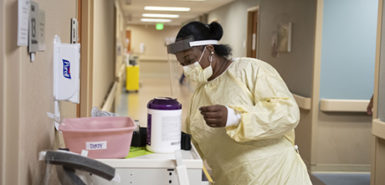
Anyone dealing with a positive case of COVID-19 may wonder: When should I seek care? Or make a trip to the emergency department?
The reassuring news is that most people testing positive with the omicron strain of COVID-19 will suffer mild symptoms of an upper respiratory illness—fever, congestion, and cough—that can be treated at home.
Most will get better on their own, said Josh Kooistra, DO, senior vice president and chief medical officer of Spectrum Health West Michigan.
“Unless you have underlying medical conditions or advanced age, most likely you are going to do just fine with COVID-19,” he said.
In general, those with a fever should remember to stay well hydrated. And take acetaminophen for fever and body aches.
But as hospitals across the U.S. are full with COVID-19 patients, there’s no denying an infection can cause serious illness. The pandemic has killed more than 860,000 Americans and 5.5 million people worldwide.
Dr. Kooistra discussed the symptoms that should prompt those with COVID-19 to seek emergency care or contact their primary care provider.
Severe trouble breathing
“Shortness of breath is the major symptom we focus on when we are looking at severity of illness,” Dr. Kooistra said.
Shortness of breath can be classified as severe, moderate or mild.
Shortness of breath is considered severe when it occurs when a person is simply sitting still, or at rest. The person may not be able to speak in full sentences.
“That’s a sign of serious illness that you need to go to the emergency department to get checked out,” Dr. Kooistra said.
It can be a sign of acute respiratory distress syndrome, a life-threatening lung condition.
Moderate
Shortness of breath is considered moderate when it occurs during normal activities around the house, such as cooking dinner or tackling mild housework.
If that happens, you should at least let your primary care provider know.
And if you have additional risk factors, such as obesity, diabetes or underlying lung disease, “you should seek care in the emergency department,” Dr. Kooistra said.
Mild
Mild shortness of breath may occur when walking up a couple of flights of stairs.
“That’s less concerning if you are otherwise healthy. It’s a symptom that some patients with COVID-19 will get,” Dr. Kooistra said. “If they are otherwise healthy, they can probably stay home and monitor their symptoms. It is a good idea to check in with your health care provider.”
Other emergency symptoms
The Centers for Disease Control and Prevention also recommends seeking emergency medical care, either by calling 911 or going to the emergency department, in the following situations:
- Persistent pain or pressure in the chest
- New confusion
- If the patient cannot be awakened or stay awake
- Bluish lips or face
Monoclonal antibody therapy
Some patients may qualify for monoclonal antibody therapy, the first COVID-19 treatment granted emergency use authorization by the U.S. Food and Drug Administration for outpatient care.
To be considered for this treatment option at a Spectrum Health location, patients must be 12 years of age or older, weigh at least 88 pounds and meet each of the following initial criteria:
- Positive COVID-19 test
- COVID-19 related symptom(s) present for seven days or less
- Patient is not hospitalized
- Patient has risk factors that increase likelihood of hospitalization.
If you have tested positive for COVID-19 and think monoclonal antibody treatment may be right for you, call 616.391.0351 to determine if you are eligible.
Anti-viral treatment options
Anti-viral treatment medications are an option for those who do not meet the criteria for monoclonal antibody therapy.
Two new oral medications are now available on a very limited basis: molnupiravir and Paxlovid.
These are not yet widely available but soon will be across West Michigan, Spectrum Health infectious disease specialist Liam Sullivan, DO, said.
“These are anti-viral treatments that people can take to help reduce the risk of hospitalization and risk of serious illness from COVID-19,” he said. “For people to benefit from this treatment, they need to reach out to their doctor as soon as they test positive.”
To be eligible a patient needs to have symptoms for less than five days. That means the earlier the better. A prompt diagnosis at the first onset of symptoms is imperative.
These medications, available only via prescription from your doctor, are in very limited supply right now, Dr. Sullivan said.
Contact your primary care physician or call the monoclonal antibody treatment center at 616.391.0351 to determine if you are eligible.
Don’t delay care
For any health emergency, patients should not avoid or delay medical care because of fears of COVID-19.
“We can provide safe care, whether you have COVID-19 or not,” Dr. Kooistra said.
Doctors have seen cases where patients postponed a trip to the emergency department for a life-threatening condition, such as a heart attack or stroke, and suffered consequences because they delayed care.
“It is far better to seek medical care and get the attention you need than to avoid that care because you are worried about COVID-19,” he said.
 /a>
/a>
 /a>
/a>
 /a>
/a>
Thank you for this very informative article. The more information that people have when to seek treatment, the fewer complications they will have and not risk serious complications or death.